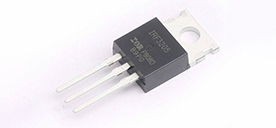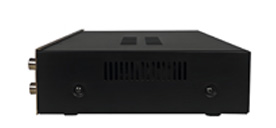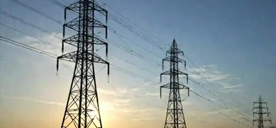Auxiliary power system: the key to ensuring stable power supply for key equipment
2024/3/7 9:42:04
Views:
Auxiliary power is a system that provides backup power to critical equipment in case of main power failure or other unexpected situations. It usually includes backup batteries, UPS, generator sets and other equipment, which operates independently from the main power supply. It is designed to ensure that critical equipment can still work normally when the main power supply is interrupted to avoid production interruption or data loss.
Types of Auxiliary Power Supply
Backup battery
The backup battery stores electrical energy through charging and releases the electrical energy for use by the equipment when the main power supply fails. It is usually used for equipment that requires short-term backup power, such as emergency lighting, security systems, etc.
Uninterruptible Power Supply System (UPS)
The UPS integrates the battery, inverter and charger, and can quickly switch to the backup power supply when the main power supply is interrupted to ensure continuous power supply to the equipment. UPS is widely used in places with extremely high power requirements, such as data centers, medical equipment, communication base stations, etc.
Generator set
The generator set drives a generator through an internal combustion engine or diesel engine to convert fuel energy into electrical energy. It can provide long-term backup power for equipment and is suitable for places that require continuous power supply, such as hospitals, factories, etc.
Application fields of auxiliary power supply
Industrial production
The auxiliary power supply system can ensure that the production line does not stop due to power interruption, ensuring production efficiency and product quality.
Commercial buildings
Elevators, air conditioners, computers and other equipment in commercial buildings have strict requirements on power supply. The auxiliary power system can provide continuous power supply when the main power supply fails to ensure normal business operation.
Medical facilities
Hospital operating rooms and medical equipment are crucial to the continuous supply of power. The auxiliary power system can ensure that medical services are not affected by power interruptions and ensure the safety of patients.
Working principle of auxiliary power supply
The auxiliary power supply system automatically switches to the backup power supply when the main power supply fails or becomes unstable to ensure continuous power supply for the equipment. When the main power supply returns to normal, the system will automatically switch back to the main power supply and resume power supply. The specific working principle includes steps such as monitoring the status of the main power supply, switching to the backup power supply, and restoring the power supply to ensure that the equipment maintains stable operation while providing uninterrupted power supply.
Advantages of Auxiliary Power Supply
Improve reliability
The auxiliary power supply system can immediately take over the power supply when the main power supply fails, ensuring the continuous operation of key equipment and improving system reliability.
Prevent data loss
For equipment that requires continuous power supply, such as computer servers and data storage devices, auxiliary power systems can avoid data loss or damage due to power interruptions.
Ensure safety
In medical facilities, emergency lighting systems and other places, the use of auxiliary power systems can ensure the stable operation of key equipment and ensure the safety of personnel.
Types of Auxiliary Power Supply
Backup battery
The backup battery stores electrical energy through charging and releases the electrical energy for use by the equipment when the main power supply fails. It is usually used for equipment that requires short-term backup power, such as emergency lighting, security systems, etc.
Uninterruptible Power Supply System (UPS)
The UPS integrates the battery, inverter and charger, and can quickly switch to the backup power supply when the main power supply is interrupted to ensure continuous power supply to the equipment. UPS is widely used in places with extremely high power requirements, such as data centers, medical equipment, communication base stations, etc.
Generator set
The generator set drives a generator through an internal combustion engine or diesel engine to convert fuel energy into electrical energy. It can provide long-term backup power for equipment and is suitable for places that require continuous power supply, such as hospitals, factories, etc.
Application fields of auxiliary power supply
Industrial production
The auxiliary power supply system can ensure that the production line does not stop due to power interruption, ensuring production efficiency and product quality.
Commercial buildings
Elevators, air conditioners, computers and other equipment in commercial buildings have strict requirements on power supply. The auxiliary power system can provide continuous power supply when the main power supply fails to ensure normal business operation.
Medical facilities
Hospital operating rooms and medical equipment are crucial to the continuous supply of power. The auxiliary power system can ensure that medical services are not affected by power interruptions and ensure the safety of patients.
Working principle of auxiliary power supply
The auxiliary power supply system automatically switches to the backup power supply when the main power supply fails or becomes unstable to ensure continuous power supply for the equipment. When the main power supply returns to normal, the system will automatically switch back to the main power supply and resume power supply. The specific working principle includes steps such as monitoring the status of the main power supply, switching to the backup power supply, and restoring the power supply to ensure that the equipment maintains stable operation while providing uninterrupted power supply.
Advantages of Auxiliary Power Supply
Improve reliability
The auxiliary power supply system can immediately take over the power supply when the main power supply fails, ensuring the continuous operation of key equipment and improving system reliability.
Prevent data loss
For equipment that requires continuous power supply, such as computer servers and data storage devices, auxiliary power systems can avoid data loss or damage due to power interruptions.
Ensure safety
In medical facilities, emergency lighting systems and other places, the use of auxiliary power systems can ensure the stable operation of key equipment and ensure the safety of personnel.
Related Information
-
-
Phone
+86 135 3401 3447 -
Whatsapp





